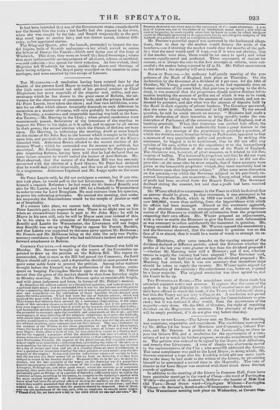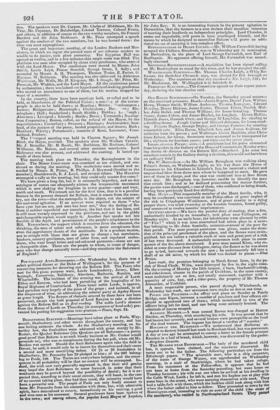rounds of applause. In addition to -the meeting of the
Livery in Common Hall, there have been particular meetings in the ward of Cheap—the ward of Farringdon Within—the parish of St. Andrew's, Holborn—the hamlet of Mike End Old Town—Bread Street ward—Cripplegate Without—Farringdon Without—St. Saviour's, Southwark—Westminster—Southwark.
The Westminster -meeting took place on Wednesday, at Covent Gite4
den. The speakers were Dr. Carpue, Mr. Chelm of Middlesex, Mr. De Vear, Mr. Poyntzer, Dr. Bainbridge, Colonel Torrens, Colonel Evans, and others, in addition of course to the two worthy members, Sir Francis Burdett and Sir John Hobhouse. A Mr. Fenn attempted a speech against the conduct of the two members, but he was hooted down: the time was most unpropitious.
The great and important meeting, of the London Bankers and Mer- chants, to which we regret the pressed state of our columns renders us unable to do justice, took place yesterday. The Egyptian Hall was opened at twelve, and in a few minutes that ample room was filled. The platform was soon after occupied by about sixty gentlemen, who entered with the Lord Mayor. The resolutions were moved by Messrs. John Smith, Lewis Loyd, Pascoe Grenfell, George Grote, I. Solly ; and seconded by Messrs. A. H. Thompson, Thomas Tooke, E. Foster, G. Norman, W. Robinson. The meeting was also addressed by Alderman Waithinan, Mr. Wells, Mr. H. Kingston, Mr. I. Gough, Mr. Price, Mr. Prescott, Mr. Wadden, and the Lord Mayor. All the resolutions passed by acclamation ; there was indeed one hypochondriacal-looking gentleman who moved an amendment to one of them, but his motion dropped for want of a seconder.
In the country, there have been meetings held, or called and to be held, at Manchester, of the Political Union ; a meeting of the towns- people is also to be held there ; at Reading ; Bristol : aouthampton ; Lewes ; Bridgewater; Barnstaple ; Cheltenham ; Devi: ,ort ; Bir- mingham; Hull ; Sunderland ; South Shields ; Dublin ; 1,urgh ; Aberdeen ; Liverpool ; Lincoln ; Battle; Dover ; Yarmouth ; N outing- ham Corporation ; Boston, called, on the refusal of the Mayor, by the requisitionists ; Canterbury ; Swansea ; Hastings ; Auchterarder, Scot- land, of the justices of the peace, landed proprietors, and feuars; Bath ; Dartford ; Whitby; Portsmouth ; counties of Kent, Lancaster, Cum- berland, Renfrew.
The Vverpool meeting was held in Clayton Square ; Sir Joseph Birch, the Mayor, presided. The speakers were Mr. Wallace Ceverie, Mr. J. Brandler, Mr. H. Booth, 31r. Rathbone, Mr. Rushton, Colonel Williance, Mr. Bolton, and several other eminent merchants. Lord Molyneux was also present, and addressed the meeting. It lasted up- wards of three hours.
The meeting took place on Thursday, the Boroughreeve in the chair. The Manor Court-room was crammed at ten o'clock, and con- tinued so during the meeting. The resolutions were moved and se. conded by Messrs. R. Potter, R. Phillips, J. Heywood (brother to the member), Shuttleworth, E. J. Loyd, and several others. The Huntites attempted a rally at the meeting, but they could only muster five votes !
We have given a long list, but it is necessarily imperfect, and no dry catalogue of names can adequately picture the irrepressible movement which is now shaking the kingdom in every quarter—east and west, north and south. We remark not for the first time, that it is a peculiar feature in the present demand for Reform, that it comes from the coun- try, not the town—that the metropolis is the object, not the subject of the universal agitation. If an answer were required to those " who have eyes but see not, and ears but hear not," that the feeling of Re- form is neither superficial nor transitory, the fact that it has been, and is still most warmly expressed in the provinces, and not in the giddy and changeable capital, would supply it. Another fact speaks not less forcibly of the depth and permanence of the people's attachment to the Bill. Everywhere, the support which it receives from the educated, the thinking, the men of talent and substance, is more conspicuous than even the approbatory shouts of the multitude. It is a prudent maxim, not to mingle with those that are given to change ; but merchants, bankers, country gentlemen, men of sober lives, and regulated enthu- siasm, who wear broad brims and sad-coloured garments—these are not a changeable class. These are the people to whom, in times of danger, men who fear change naturally turn—and they constitute the Reformers of England



























 Previous page
Previous page